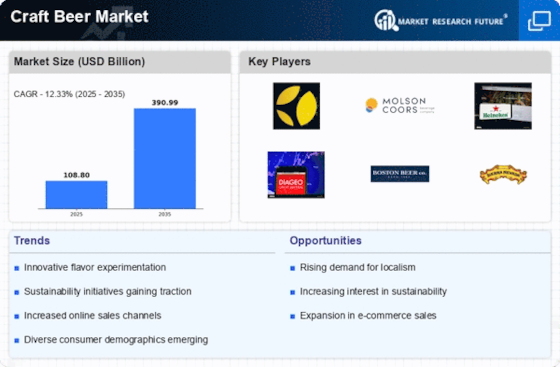Top Industry Leaders in the Craft Beer Market

The craft beer market has experienced exponential growth in recent years, fostering a highly competitive landscape fueled by a surge in consumer interest in unique and artisanal brews. This industry, characterized by a multitude of players ranging from established giants to nimble startups, showcases a diverse range of strategies to capture market share and innovation.
Strategies Adopted:
Market incumbents have implemented strategies like product diversification, aggressive marketing campaigns, and distribution network expansions to maintain their dominance. They leverage their vast resources to introduce new flavors, collaborate with other breweries, and invest heavily in advertising to target specific demographics. Conversely, smaller craft breweries focus on unique brewing techniques, limited-edition releases, and community engagement to carve their niche and build brand loyalty.
Factors for Market Share Analysis:
Market share analysis in the craft beer industry encompasses various factors. These include distribution reach, brand recognition, product quality, consumer preferences, pricing strategies, and geographical presence. The ability to adapt to changing consumer tastes and preferences, while maintaining consistent quality, often determines a company's market share.
New and Emerging Companies:
The craft beer market continually welcomes new entrants looking to disrupt the status quo. Emerging companies like Modern Times Beer, Founders Brewing Co., and New Belgium Brewing Company have gained traction by offering innovative brews, sustainability initiatives, and a strong connection with consumers through social media engagement and taproom experiences.
Industry News and Investment Trends:
The industry is abuzz with news of collaborations between breweries, sustainability efforts, and technological advancements in brewing processes. Furthermore, there's a noticeable trend toward investment in eco-friendly practices, such as water conservation and renewable energy, reflecting the market's growing emphasis on sustainability.
Current Company Investment Trends:
Recent trends highlight a surge in investments towards expanding production capacity, enhancing distribution networks, and diversifying product portfolios. Additionally, strategic partnerships, mergers, and acquisitions remain prevalent as larger companies seek to tap into the creativity and market potential of smaller craft breweries.
Overall Competitive Scenario:
The competitive landscape of the craft beer market is a dynamic interplay between established conglomerates and nimble independent breweries. The giants leverage economies of scale and vast resources to dominate shelf space and distribution channels, while smaller players differentiate themselves through innovation, quality, and community engagement.
the craft beer market remains a dynamic and competitive space driven by innovation, consumer preferences, and strategic maneuvers. While established players strive to maintain their market dominance through diversification and aggressive marketing, smaller breweries disrupt the market with unique offerings, sustainability initiatives, and direct consumer engagement. The evolving trends in investment, industry news, and emerging companies shape a landscape where adaptability and innovation are key to thriving amidst fierce competition.
Recent Development by companies:
Leading the pack are established players such as Anheuser-Busch InBev, Molson Coors Beverage Company, and Heineken, which have expanded their portfolios to include craft beer brands through acquisitions of smaller breweries. However, the market has also witnessed the rise of independent craft breweries like Sierra Nevada Brewing Company, Stone Brewing, and Dogfish Head Brewery, emphasizing quality, innovation, and regional appeal.
The near about $26 billion craft beer market in the United States, the competition compels numerous small brewers to vie for retail and restaurant placements, seeking optimal point-of-sale locations. However, this pursuit introduces fresh hurdles, notably concerning diminished profit margins from wholesale transactions.
Key Companies in the craft beer market includes
- Boston Beer Company Inc.
- Yuengling & Sons Inc.
- New Belgium Craft Brewery
- Deschutes Brewery
- North Brewing Company











